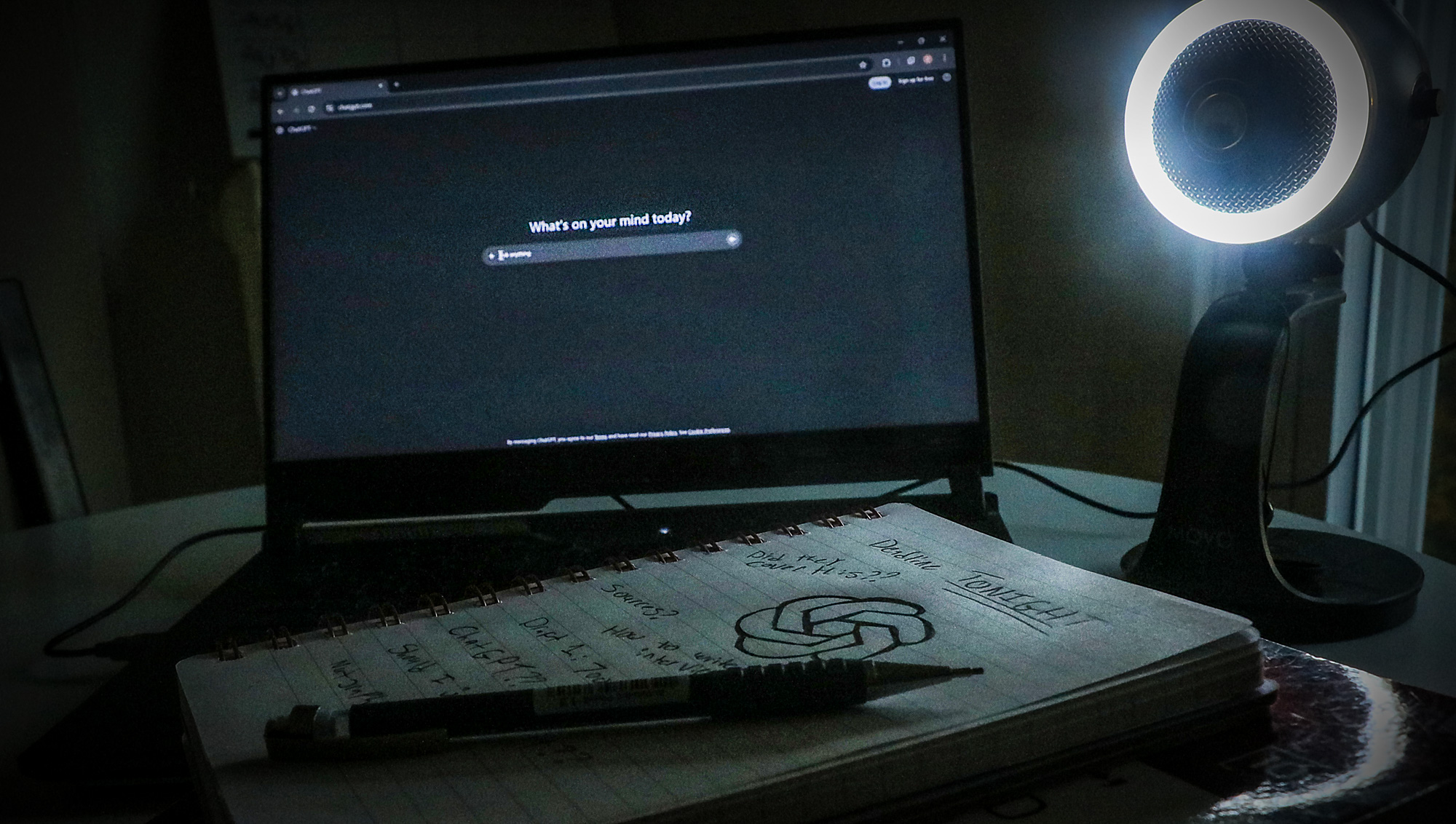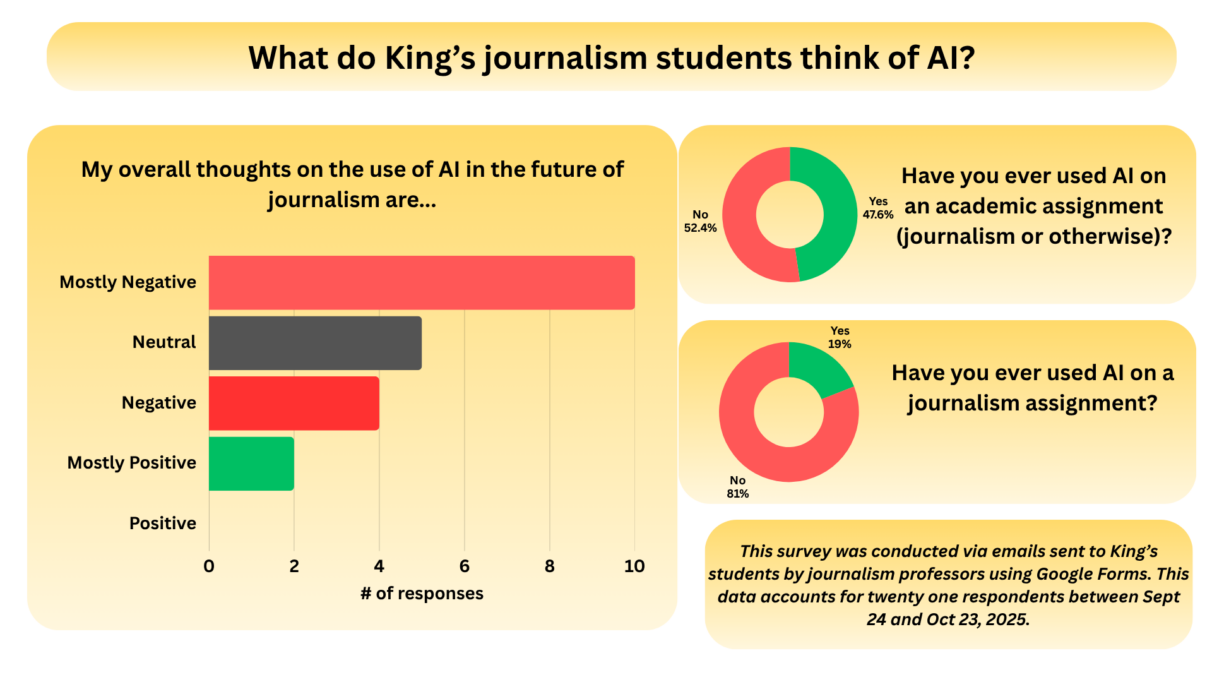ChatGPT made me do it

caption
A laptop displaying ChatGPT sits open on a table beside a notebook and journalism textbooks.If this article was AI generated, would you care? An analysis of the future of AI in journalism studies
It’s Mariana Luz’s first time ever completing a university level essay.
Luz has moved from writing on their bed, to their dorm room, to the King’s library, then to the dormitory common room. Earlier, they tried going to the designated writing coach for help, only to find that they were out of time slots to meet with them until after the essay was due.
While they’ve written essays in the past, they’ve never had to attempt one at this level. It’s an especially challenging task for someone like Luz, a Brazilian student whose first language is not English.
“I was so stressed out while writing it,” they recalled in an interview with The Signal. “I remember going to Patrol because I didn’t know who else to ask for help.” (Patrol is a team of students who are on call at night and help ensure residences are safe.)
While Luz, who uses they/them pronouns, is generally quite firm in their anti-AI stance due to environmental concerns, this is one of the few times they’ve ever really been tempted to give it a try. As a second-year journalism student at King’s, they face the same dilemma as every other journalism student and professor: what role should AI, or artificial intelligence, play in the future of journalism studies?
ChatGPT, a popular generative AI tool, has been a subject of debate since its release in 2022, with newsrooms and journalism classrooms being no exception.
The new technology can generate an academic-style paper in minutes, in response to written or verbal questions posed by students or other users. ChatGPT’s detractors say it plagiarizes original work, is error-prone, and allows students to take shortcuts that prevent learning.
Whether ChatGPT changes journalism forever, or threatens the craft, one thing is certain: the industry cannot ignore generative AI.
The future: Is AI the answer?
While many journalism schools are still uncertain about how to deal with AI, the University of British Columbia takes a different approach.
At UBC, instructors are responsible for determining their own AI policy for their courses. The university’s guidelines on GenAI tools in teaching and learning say “the use of ChatGPT or other generative AI tools does not automatically equate to academic misconduct at UBC. At this time, whether the use of AI tools in courses is or is not allowed is a course or program-level decision.”
Alfred Hermida, a UBC journalism professor who advocates using AI in academia, told The Signal about his plans to teach a new course in January 2026 on using AI for journalism.
At his university, using AI is not punished in the same way as other schools, with UBC operating on the assumption that whether or not these technologies are allowed, most students will use them anyway. Hermida’s focus lies in teaching students how to use AI responsibly.
One way he does this in his research course is by having his students ask ChatGPT to write a research paper — then, making them go through it much like he would when marking an assignment. This way, he says students learn how to use the technology and where some of its faults lie.
“If I want students to learn how to research a topic, how to find what are the leading theories, frameworks methods in journalism studies and understand what it means, students are achieving all of that. What I’ve changed is how we do it,” Hermida said.
Hermida isn’t alone in thinking journalism schools may be the perfect training ground for students to experiment with generative AI.
Stephen Kimber is a retired J-school professor at the University of King’s College. Beginning his journalism career in the late 1960s at the Dalhousie Gazette, Kimber has seen his fair share of developments in journalism. In the ’90s, he even helped develop the first online journalism course in Canada.
And while his AI experiences have not always been reassuring in terms of factual accuracy, he says he doesn’t think the industry should overlook it either. After all, journalists have always taken some time to adjust to changing technology — and whether it was the internet or the integration of news into social media, for Kimber the anxieties surrounding AI are nothing new.
“It’s an existential crisis if you’re talking about the way we’ve done things in the past,” he said over coffee at a shop on Quinpool Road.
“The only way you figure out what works (and) what doesn’t is to try it. And I think journalism schools are a great place to do that. It’s an opportunity for experiments, right?”
Meanwhile, in student newsrooms . . .
It’s spring 2025 and Toronto Metropolitan University’s student newspaper, The Eyeopener, is having a staff meeting in the room they call The Eye Office.
Journalism students Jasmine Makar and Daniel Opasinis are two of the members. Makar is doing her own work at her desk while Opasinis and another student investigate a student submission that raised some questions.
Clicking on the Google doc’s history, they can see the first draft . . . ChatGPT prompt and all.
“I was just in shock,” Makar said. Opasinis said the team understood that AI had changed their jobs.
“I remember in the office kind of all of us looking at each other and realizing that this is going to be something that we have to add to our everyday checklist. Like when not only do we have to check if they missed a period at the end of a quote or if they forgot to add a crucial part of a piece of information near the top of the story. Now we have to actively make sure that a robot didn’t write it for them.”
While many students struggle to hand in work on time, Makar and Opasinis said they do not think that is an excuse to rely on AI for journalistic work.
So how can the overuse of AI in journalism submissions be discouraged?
“All our deadlines are relatively tight, but if we loosen up those deadlines to give more people and more flexibility to not use AI, then now it’s kind of going against the practice, the art of journalism, right? So it’s kind of it contradicts,” Makar said.
At Edmonton’s MacEwan University, Amanda Erickson has noticed the same thing at her student paper, The Griff.
“We’ve had instances where we’ve caught students submitting full articles that were written by ChatGPT,” said Erickson, who uses she/they pronouns.
“Our whole point of the paper . . . is that we are a service to students for you to get published, for you to get properly edited in a way that is non-judgmental and a little bit more cohesive than what a professor has time to do. And so for people that just kind of [are] mailing it in makes me a little nervous.”
Erickson says they find the whole thing disheartening.

Where do we draw the line?
While some newsrooms like the New York Times have already adopted certain uses of AI into their journalism, other independent news sources have taken the opposite approach. The Halifax Examiner is one.
For journalist and founder Tim Bousquet, integrating AI into journalism is an accident waiting to happen — not just because of the possible damage to the public’s trust, but also because of what journalists might lose in the process, especially if they become too reliant on these new technologies.
“They’re not going to learn how to think for themselves,” Bousquet said.
“Thinking for yourself means getting lost, being confused, not having an answer, not having an answer a thousand times in a row and then coming into a realization because of that. Handing something to a machine that spits out something that may give you an answer, may not be the answer. It may not be the answer you would have — well it won’t be the answer you would have, the insight you would have gained by being wrong a thousand times.”
Every journalism student we interviewed or surveyed for this article agreed that journalism should be about human discovery first and foremost. Even still, Mariana Luz said they understand that it isn’t always that simple.
“Part of learning is making mistakes and, you know, like, getting things wrong and then getting that feedback and, like, learning from it and growing from it. But I also can acknowledge that that is really really hard to do when we are put into a system where our grades matter so much.”
Journalism is messy (and maybe it should be)
When Daniel Opasinis got his first news story back from his school’s paper, it came back as a “messed up” Google doc completely covered in green edits.
“I was like, ‘I’m — I have to drop out, there’s nothing here for me anymore,’ ” Opasinis, who uses he/they pronouns, recalled with amusement.
While his initial reaction was one of “horror”, the experience was what first made them realize just how deep journalism could go, and their love for the craft as a whole.
“It’s an incredibly busy job but it’s like my favourite thing to do. I couldn’t see myself doing anything else.”
Milo Fowler is in the one-year bachelor of journalism program at King’s. He has also used generative AI in the past to summarize readings or make study guides for other classes. When it comes to journalism, however, he refuses to use the AI tools and he finds a similar sentiment among his peers.
“People are really keen to prove that they’re writing authentically,” he said.
“I like writing, like that’s something that I don’t want automated. You know what I mean? Like, I enjoy doing that myself.”
Whether journalism instruction will include AI in the future is still up for debate, but students seem to agree that no matter what form that takes, its core should always be human, even if that core isn’t as clean as what a program might spit out at you.
“Don’t be afraid to suck when you start, I think, is like my main thing,” Erickson explained when asked about the advice she’d give to students currently relying on AI for their work.
“It’s okay to be bad quote-unquote, because we’re all learning. That’s the whole cool part about university, is that you get to kind of be not the greatest and then you get better as it goes, right?”
About the author

Talia Freedhoff
Talia is a fourth year journalism student at the University of King's College. They enjoy writing, identifying strange edible plants and playing...
